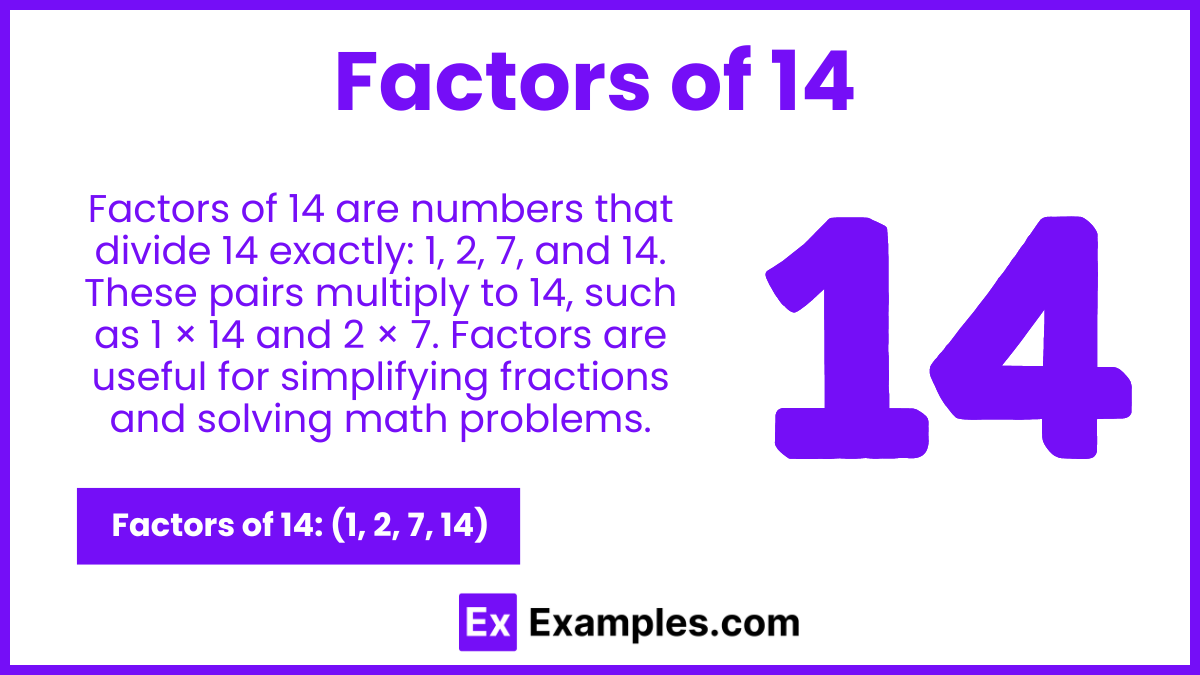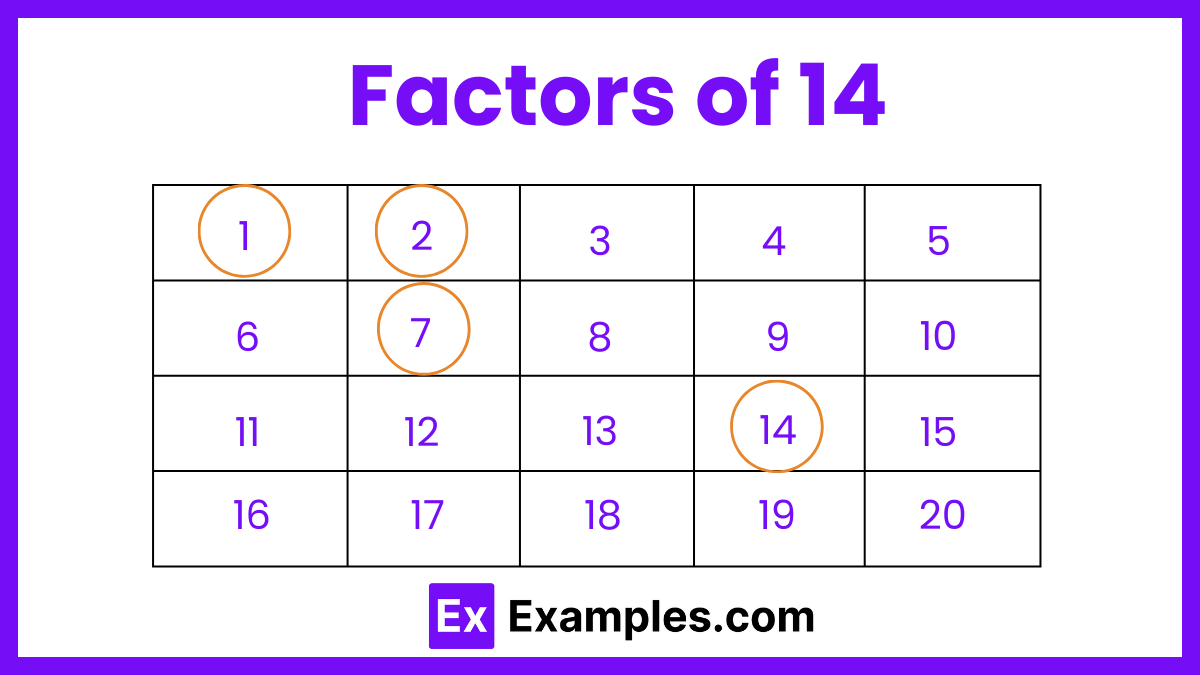What are the factors of 14?
1, 2, 3, 7, 14
1, 2, 7, 14
1, 3, 5, 7
1, 2, 4, 7, 14

The factors of 14 are 1, 2, 7, and 14. These are the numbers that can divide 14 without leaving a remainder. To determine these factors, start with 1 and the number itself, then check the integers in between. Since 14 is the product of the prime numbers 2 and 7, its prime factorization is 2 × 7. Knowing the factors of a number is essential for simplifying fractions, finding greatest common divisors, and solving problems related to divisibility. This basic understanding helps in various mathematical calculations and applications.

The factors of 14 are the numbers that can be multiplied together to get the product of 14, and they include 1, 2, 7, and 14. These numbers divide 14 without leaving any remainder. To find the factors, start with 1 and the number itself, then check the integers in between. The number 14 is a product of the prime numbers 2 and 7, giving it a prime factorization of 2 × 7. Understanding the factors of a number is crucial for various mathematical concepts such as simplifying fractions, finding greatest common divisors, and solving problems related to divisibility.
Understanding these factor pairs is useful for breaking down numbers in multiplication and division, simplifying fractions, and solving various mathematical problems. Factor pairs are essential in determining least common multiples, greatest common divisors, and in the process of factoring algebraic expressions. This knowledge aids in a deeper comprehension of number properties and their relationships.
Calculating the prime factors of a number involves breaking down the number into its basic building blocks, which are prime numbers. Prime factors are prime numbers that, when multiplied together, give the original number. Here is a step-by-step guide to finding the prime factors of 14.
Prime numbers are numbers greater than 1 that have no divisors other than 1 and themselves. Examples include 2, 3, 5, 7, 11, etc.
Begin with the smallest prime number, which is 2. Check if 14 is divisible by 2.
14 ÷ 2 = 7
Since 14 is divisible by 2, 2 is a prime factor.
After dividing 14 by 2, you get 7. Now, check if 7 is a prime number.
7 is a prime number because it is only divisible by 1 and 7.
Since 7 is a prime number and no further division is needed, the prime factors of 14 are:
2 and 7
To find all factors of 14, list all numbers that divide 14 without leaving a remainder.
Thus, the factors of 14 are: 1, 2, 7, and 14.
Prime factorization involves expressing 14 as a product of its prime factors.
So, the prime factorization of 14 is: 2 × 7.
Factor pairs are two numbers that, when multiplied, give the original number (14).
Thus, the factor pairs of 14 are: (1, 14) and (2, 7).
If you want to find common factors of 14 and another number, such as 28, list the factors of both numbers and find the common ones.
Common factors are: 1, 2, 7, and 14.
To find the GCF of 14 and another number, say 21, list the factors of both and identify the greatest one.
Understanding how to find and work with the factors of 14 can be made easier with some useful tips. These tips will help you quickly determine the factors and utilize them effectively in different mathematical scenarios.
The greatest common factor (GCF) of 14 and another number is the largest number that divides both numbers without leaving a remainder. For example, the GCF of 14 and 21 is 7.
To use the prime factorization method to find the factors of 14:
The sum of all factors of 14 is 1 + 2 + 7 + 14 = 24.
No, 14 cannot have an infinite number of factors. The factors of any number are finite. For 14, the factors are specifically 1, 2, 7, and 14.
False. 4 is neither a multiple nor a factor of 14. The factors of 14 are 1, 2, 7, and 14. The multiples of 14 include numbers like 14, 28, 42, and so on.
The multiples of 14 are the numbers obtained by multiplying 14 with integers. Some of the multiples of 14 include 14, 28, 42, 56, 70, 84, 98, 112, 126, and 140. These numbers are all divisible by 14 without leaving a remainder.
Text prompt
Add Tone
10 Examples of Public speaking
20 Examples of Gas lighting
What are the factors of 14?
1, 2, 3, 7, 14
1, 2, 7, 14
1, 3, 5, 7
1, 2, 4, 7, 14
Which of the following is not a factor of 14?
1
2
3
7
Which of the following numbers is a factor of 14?
7
9
11
15
What is the product of the factors of 14?
28
84
14
49
Which pair of factors of 14 adds up to 15?
1 and 14
2 and 7
7 and 14
1 and 7
Which of the following numbers is not a factor of 14?
1
2
5
7
Which factor of 14 is a prime number?
1
2
14
7
If you multiply all the factors of 14, what is the result?
14
28
84
49
Which factor of 14 is closest to 10?
1
2
7
14
Which of the following is a factor pair of 14?
(1, 14)
(2, 5)
(7, 8)
(14, 14)
Before you leave, take our quick quiz to enhance your learning!

